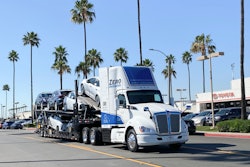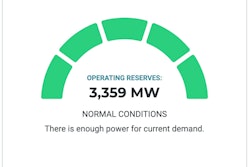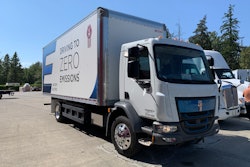Trucking news and briefs for Wednesday, Sept. 28, 2022:
Biden approves $5 billion plan for nationwide electric vehicle infrastructure
The race to widely deploy electric vehicles has largely been a case of chicken and egg. Without the infrastructure to charge them, consumers en masse had no incentive to purchase EVs. Yet, with no EV density on the highway, there was no incentive to install infrastructure. Until now.
The Biden-Harris Administration Tuesday approved Electric Vehicle Infrastructure Deployment Plans for all 50 States, the District of Columbia and Puerto Rico ahead of schedule under the National Electric Vehicle Infrastructure (NEVI) Formula Program, established and funded by President Joe Biden’s Bipartisan Infrastructure Law.
The approval unlocks access to more than $1.5 billion through next fiscal year to help build EV chargers covering approximately 75,000 miles of highway across the country. The NEVI formula funding under the Bipartisan Infrastructure Law, which makes $5 billion available over five years, will help build a convenient, reliable and affordable EV charging network across the country.
California is slated to get the single largest slice of the funding – more than $383,000,000 through 2026. Florida, at $198,000,000 is next. Washington D.C. ($16,600.000), New Hampshire ($17,200,000), Delaware ($17,600,000) and Hawaii ($17,600,000) were among the states receiving the lowest amounts. Puerto Rico was allocated $13,600,000. Find a state-by-state breakdown here.
States can use NEVI Formula funding for projects directly related to the charging of a vehicle, including upgrading of existing and construction of new EV charging infrastructure; operation and maintenance costs of these charging stations; installation of on-site electrical service equipment; community and stakeholder engagement; workforce development activities; EV charging station signage; data sharing activities; and related mapping analysis and activities.
Emergency HOS declaration extended in Oregon
An emergency hours of service declaration allowing certain truck drivers to operate outside of certain hours regulations in Oregon has been extended through the end of October.
Oregon Gov. Kate Brown on Aug. 27 issued an emergency declaration in the state due to wildfires and “critical fire danger” resulting from high temperatures, winds, storms with dry lightning and persistent drought.
The declaration was originally set to expire Sept. 26, but the emergency is still ongoing, and FMCSA extended it through Oct. 31.
Truck drivers providing direct assistance to the wildfire emergency in Oregon are exempt from Part 395.3 (maximum driving time) of FMCSA’s regulations. Direct assistance does not include routine commercial deliveries, including mixed loads with a nominal quantity of qualifying emergency relief added to obtain the benefits of the emergency declaration, FMCSA noted.
FMCSA to allow UPS to train CLP holders on double trailers
The Federal Motor Carrier Safety Administration has granted an exemption to UPS (CCJ Top 250, No. 2) to allow the company to conduct behind-the-wheel training for commercial learner’s permit (CLP) holders in twin 28-foot trailers, rather than waiting to conduct the training after the drivers receive their Class A CDLs and pass the required knowledge test to obtain the double/triple trailer endorsement.
UPS requested the exemption in February 2020. FMCSA said UPS wanted to “ensure that its driver-trainees know how to safely operate the vehicles they will be driving in normal operations” and that the company planned “to train its Class A CLP holders to operate double trailers prior to the individuals receiving their CDLs and taking the double/triple trailer knowledge test.”
Under the requested exemption, UPS driver-trainee CLP holders will be able to obtain on-the-road training in doubles only under direct supervision of a certified driver instructor who has completed UPS’s eight-week UPS Driver Trainer and Instructor Program and is recertified every 90 days before obtaining a CDL and the required endorsement for operating such CMVs.
FMCSA said that before granting the request, it conducted a “comprehensive review of UPS’s safety performance,” including inspection and accident reports and more.












